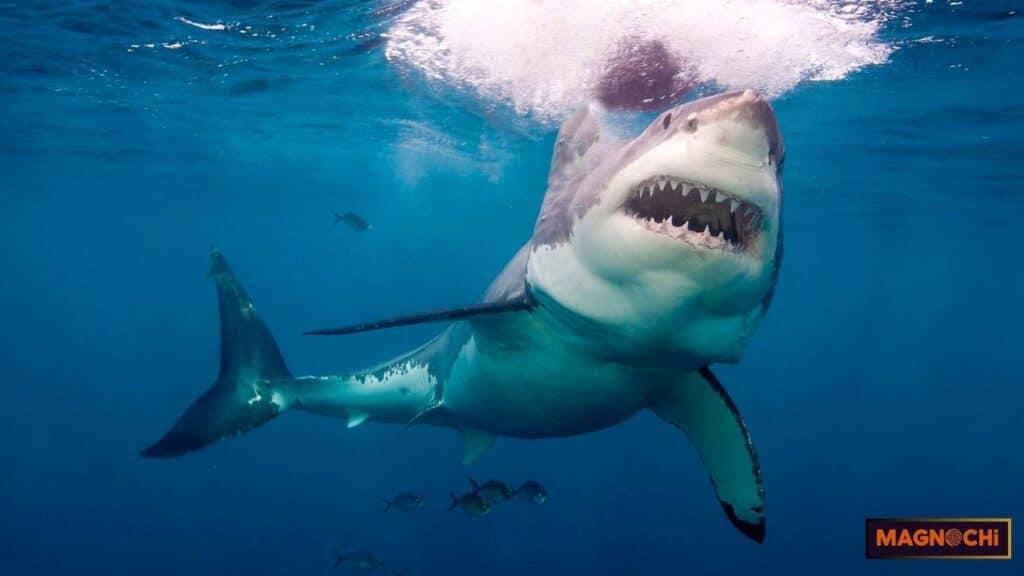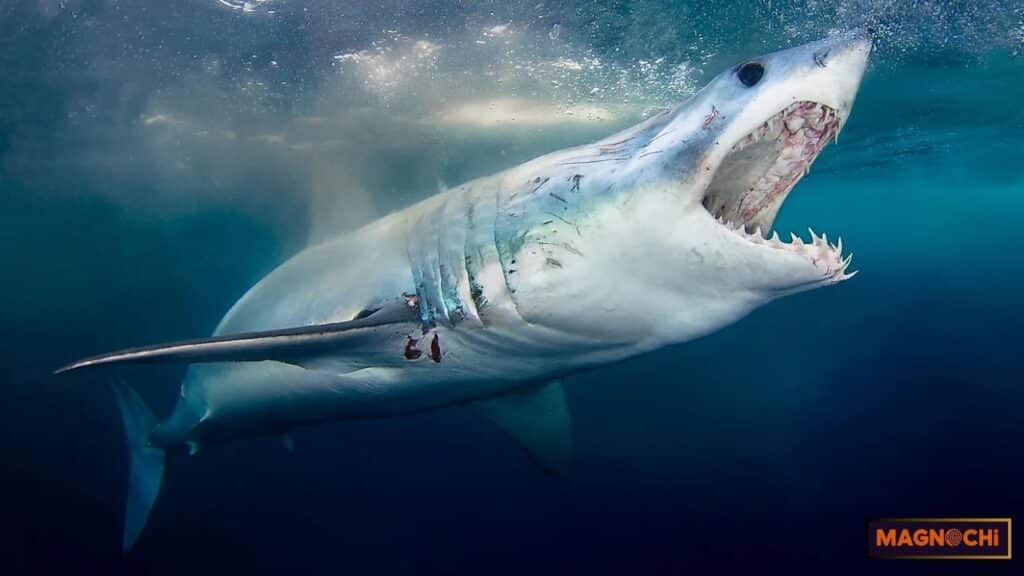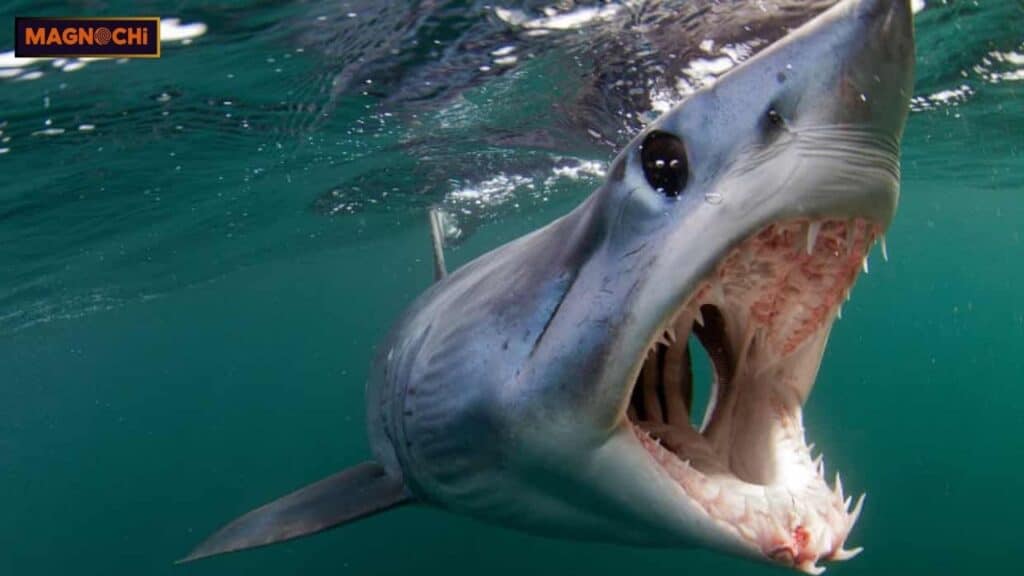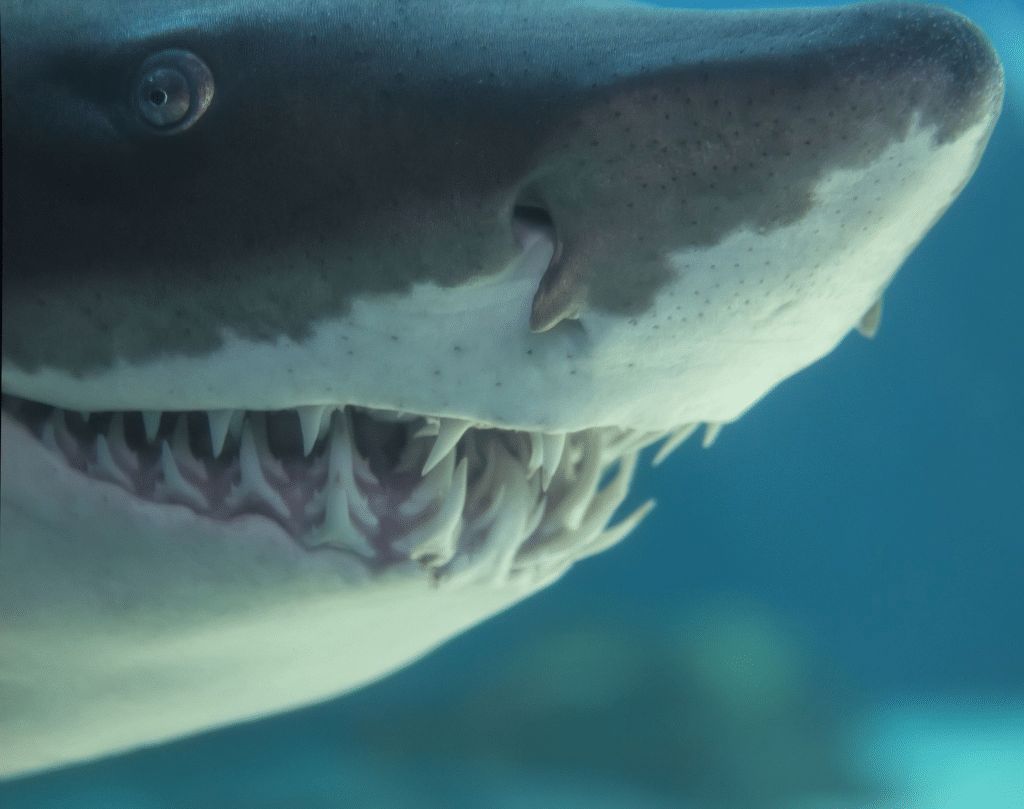Do Mako Sharks Attack Humans? Sharks are often regarded as the ultimate predators of the ocean, and among them, the Mako shark stands out.
With their impressive speed, sleek bodies, and predatory nature, Mako sharks evoke both fascination and fear.
But when it comes to humans, the real question is: do Mako sharks attack humans?
In this article, we will explore the nature of Mako sharks, including their behavior, diet, and interaction with humans.
We will also delve into documented shark attacks, explain the reasons behind them, and discuss how we can safely co-exist with these magnificent creatures.
Along the way, we will also cover the conservation status of Mako sharks, emphasizing the importance of protecting these apex predators.
Understanding the Mako Shark
Before diving into whether Mako sharks are dangerous to humans, it’s crucial to understand the species itself.
The Mako shark is a member of the Lamnidae family, known for being one of the fastest sharks in the world.
There are two species of Mako sharks: the Shortfin Mako and the Longfin Mako, each with unique characteristics and behaviors.
What Is a Mako Shark?
The Mako shark is a large, predatory species that thrives in both temperate and tropical waters.
Renowned for their speed, these sharks can reach up to 60 mph (97 km/h), making them the fastest shark species in the world.
Their long, streamlined bodies are designed for swift movement, enabling them to chase down agile prey. [Do Mako Sharks Attack Humans?]
The Shortfin Mako (Isurus oxyrinchus) is the most well-known species. It is typically found in coastal waters but also roams deeper oceanic environments.
The Longfin Mako (Isurus paucus), while similar in many respects, is more common in colder waters and is less frequently encountered by humans.
Mako sharks are apex predators, meaning they are at the top of the food chain in their ecosystems, with few natural predators.
This position in the marine hierarchy makes them essential for maintaining the balance of marine ecosystems by regulating the populations of their prey.
Characteristics of Mako Sharks
- Speed: As the fastest sharks, Mako sharks use their speed to catch fast-moving prey like tuna, mackerel, and swordfish. Their muscular, streamlined bodies allow them to make quick, powerful movements, essential for catching and overpowering their prey.
- Appearance: Mako sharks have a sleek, hydrodynamic body that facilitates their high-speed movements. Their coloration is typically blue-grey on the back, fading to white on the underside, providing camouflage in the open ocean.
- Diet: Mako sharks are carnivores, feeding primarily on fast-swimming fish, squid, and occasionally marine mammals. Their hunting strategy involves ambushing prey, often from below, where they surprise their targets with explosive bursts of speed.
- Habitat: These sharks are found in temperate waters and tropical oceans around the world. They prefer deep waters, although they can occasionally be found closer to shore, particularly when chasing prey.

Are Mako Sharks Dangerous to Humans?
One of the most common questions about Mako sharks is whether they pose a danger to humans.
The short answer is that Mako sharks are not naturally dangerous to humans, but they can potentially attack in certain situations.
To better understand the risks, it’s important to examine shark attacks, Mako shark behavior, and the likelihood of human encounters.
Shark Attacks on Humans: A Rare Occurrence
Although shark attacks on humans are sensationalized in the media, Mako shark attacks are rare events. [Do Mako Sharks Attack Humans?]
On average, there are only a handful of documented attacks each year involving Mako sharks, and most of these attacks result in minor injuries rather than fatalities.
To put this into perspective, the International Shark Attack File (ISAF), which tracks shark attacks worldwide, reports that Mako sharks are involved in only a small percentage of the total shark attacks on humans.
While sharks in general are often feared, the vast majority of species, including Mako sharks, do not actively seek out humans as prey.
Why Do Mako Sharks Attack Humans?
Sharks, including Mako sharks, do not typically view humans as a food source. However, there are several reasons why Mako sharks may bite a human:
- Mistaken Identity: One of the most common reasons for shark attacks is mistaken identity. Mako sharks may confuse a swimmer, surfer, or diver with their natural prey, such as a seal or sea lion. From below the water’s surface, humans on surfboards or wearing wetsuits can resemble the shape and silhouette of these marine mammals.
- Curiosity: Sharks are naturally curious animals, especially younger sharks. A shark may approach a human out of curiosity and take a small exploratory bite to assess the object. This is common in juvenile sharks, who are still learning about their environment.
- Provocation or Threats: Like many animals, Mako sharks can become aggressive if they feel threatened. While it’s rare for Mako sharks to attack humans in self-defense, they may display aggressive behavior if provoked.
Are Mako Sharks Aggressive?
While Mako sharks are apex predators and exhibit aggressive behavior when hunting, they are not generally considered aggressive toward humans.
Their aggressive tendencies are typically directed toward their prey, such as tuna or mackerel, rather than people.
In comparison to species like the Great White or Bull Shark, which have been responsible for more attacks on humans, Mako sharks are less likely to attack unless provoked or mistaken.
Most shark encounters are a result of curiosity, not predatory aggression.

The Behavior of Mako Sharks
To understand the likelihood of a Mako shark attack, it’s essential to study their behavior in the wild. [Do Mako Sharks Attack Humans?]
Mako sharks are highly energetic, and their movements in the ocean are driven by the need to hunt and survive.
Mako Shark Hunting Behavior
Mako sharks use their incredible speed to chase down prey, often using a hit-and-run strategy.
They typically ambush their prey from below, using the element of surprise to make a high-speed attack.
This makes them highly effective at catching agile fish like swordfish and tuna, which are known for their speed and strength.
Unlike some other sharks that scavenge or hunt in packs, Mako sharks are solitary hunters.
They rely on their individual hunting skills to catch fast-moving prey, often pursuing them across great distances in the open ocean.
Mako Shark Territorial Behavior
Mako sharks are not particularly territorial, but they can become aggressive if they feel threatened.
In the wild, they are known to be highly migratory, often covering large distances as they search for food and favorable water temperatures.
This migration is largely influenced by the availability of prey and environmental conditions, such as warm water currents. [Do Mako Sharks Attack Humans?]
Because of their migratory nature, Mako sharks are constantly moving through different regions of the ocean, sometimes coming into contact with humans.
However, such encounters are relatively rare, and the shark’s behavior is typically focused on feeding and survival, not aggression toward humans.

Mako Shark Diet: What Do They Eat?
Understanding what Mako sharks eat helps us better understand their behavior and why they may occasionally bite humans.
Mako sharks are carnivores that feed primarily on fast-moving fish, squid, and occasionally marine mammals.
Primary Prey of Mako Sharks
- Tuna: One of the Mako shark’s favorite meals. Mako sharks often hunt tuna in deeper waters, where these fast swimmers live.
- Swordfish: Another large fish that Mako sharks frequently hunt. Swordfish are powerful and fast swimmers, making them a suitable challenge for the agile Mako shark.
- Mackerel: Mako sharks also feed on mackerel, which are abundant in many parts of the ocean and serve as a reliable food source.
- Squid: Mako sharks are known to hunt squid, especially in deeper parts of the ocean.
How Humans Fit into the Shark’s Diet
Humans are not part of the Mako shark diet. In fact, Mako sharks are unlikely to see humans as food. When a shark bites a human, it is often due to confusion or curiosity.
Many shark bites on humans are exploratory, and the shark may quickly release the person after a brief bite. [Do Mako Sharks Attack Humans?]
Can Humans Avoid Mako Shark Attacks?
While Mako sharks are generally not a threat to humans, it’s still important to take safety precautions when swimming, diving, or surfing in areas where sharks are known to live.
Shark Prevention Measures
- Avoid Shark-Prone Areas: Some areas are known to have higher concentrations of sharks, especially around fishing zones or migratory paths. Always check local shark activity reports before entering the water.
- Use Shark Repellents: There are devices on the market, such as electric shark repellents, that are designed to deter sharks from approaching. These devices work by emitting an electric field that sharks find unpleasant.
- Stay Calm in the Water: If a shark approaches, try to stay calm and avoid sudden movements. Sharks may interpret rapid movements as signs of distress, which can trigger an attack.
- Avoid Swimming at Dusk or Dawn: Sharks are more likely to be active during low-light conditions, such as dawn or dusk. These are also times when their prey, like seals, are most active.
- Don’t Swim Alone: Sharks are more likely to target isolated individuals. Always swim in groups when possible, as sharks are less likely to attack a larger group.
- Avoid Bright Colors and Shiny Jewelry: Sharks are attracted to bright, shiny objects, which can resemble the scales of fish. Avoid wearing jewelry or brightly colored swimsuits when swimming or diving in shark-prone areas.
Mako Shark Conservation: A Species at Risk
Despite their power and speed, Mako sharks face significant threats from human activities. Overfishing and bycatch have caused Mako shark populations to decline, especially the Longfin Mako.
Threats to Mako Shark Populations
- Overfishing: Mako sharks are often caught as bycatch by commercial fishing operations targeting other species. This has led to a significant decrease in their populations.
- Bycatch: Mako sharks are often accidentally caught in fishing nets and lines, leading to injuries and deaths. This is a major issue for both Shortfin Mako and Longfin Mako sharks.
- Habitat Degradation: The destruction of marine ecosystems, through pollution or overfishing, has had a negative impact on Mako shark populations. Declines in their prey species can also harm their survival.
Conservation Efforts
Various organizations and countries have initiated conservation programs aimed at protecting Mako shark species, such as implementing protected marine areas and limiting shark fishing during specific seasons.
The goal is to create a sustainable balance between protecting shark populations and the needs of local fisheries.

Final Verdict
Mako sharks, while powerful and capable of attacking humans, do so very rarely.
These sharks do not consider humans as part of their natural diet and generally avoid interaction with people. [Do Mako Sharks Attack Humans?]
When attacks do occur, they are often a result of mistaken identity or defensive behavior, typically triggered by human presence in the shark’s territory or by sudden, threatening movements.
By understanding Mako shark behavior and implementing basic safety measures, the risk of encountering a shark can be minimized significantly.
It’s essential to remember that these apex predators play a vital role in maintaining the health of marine ecosystems, and attacks on humans are exceptional, not the norm.
As with any wildlife encounter, respect, caution, and awareness are key to peaceful coexistence.
FAQs
Has a Mako Shark Ever Killed a Person?
While Mako sharks have been involved in attacks, fatalities are extremely rare. Most interactions are due to mistaken identity or curiosity, not predatory behavior. There are only a few reported deaths caused by Mako sharks. Overall, attacks on humans by this species are uncommon.
Are Mako Sharks Dangerous to Humans?
Mako sharks are not typically dangerous to humans. They generally avoid people and do not see humans as prey. Shark attacks usually happen due to mistaken identity or provocation. With proper safety precautions, the risk is very low.
Which Shark Attacks Humans Most?
The Great White shark is responsible for the most shark attacks on humans. It is known for its size, power, and aggressive nature, making it more likely to target humans. Tiger sharks and Bull sharks are also known for frequent attacks. However, all shark attacks are rare overall.
What Is the Friendliest Shark?
The Whale shark is considered the “friendliest” shark. Despite being the largest species, it feeds on plankton and poses no threat to humans. It is known for its gentle nature and is often a favorite among divers. These sharks are docile and curious but harmless.
Are Tiger Sharks Aggressive?
Tiger sharks are known to be more aggressive compared to many other species. They are opportunistic feeders and will bite almost anything they encounter. However, most interactions with humans are due to mistaken identity rather than deliberate aggression.
Was Megalodon a Mako Shark?
No, the Megalodon was not a Mako shark. While both are from the same family of sharks, Megalodon was a separate species and much larger. Megalodon lived millions of years ago and is now extinct. Mako sharks are much smaller and faster than Megalodons ever were.
Are Bull Sharks Aggressive?
Bull sharks are known for their aggressive nature, especially in coastal areas. They are highly territorial and can be more dangerous than other sharks due to their ability to swim in both salt and freshwater. Despite their reputation, most interactions with humans are rare and avoidable.
Has a Hammerhead Ever Killed a Human?
Although Hammerhead sharks have been involved in some incidents, they are rarely responsible for fatalities. They are generally not considered dangerous to humans. Most attacks are thought to be a result of mistaken identity or accidental provocation. Hammerheads are typically shy and non-aggressive.
Conclusion: Do Mako Sharks Attack Humans?
Mako sharks do not actively seek out humans as prey. Shark attacks on humans, while occasionally sensationalized, are rare events.
Most attacks occur due to mistaken identity or curiosity, rather than predatory behavior.
Despite their fearsome reputation, Mako sharks are crucial for the health of marine ecosystems and deserve our protection.
Conservation efforts are vital to ensuring that these incredible creatures continue to thrive in our oceans. [Do Mako Sharks Attack Humans?]
Read more knowledgeable blogs on Magnochi









